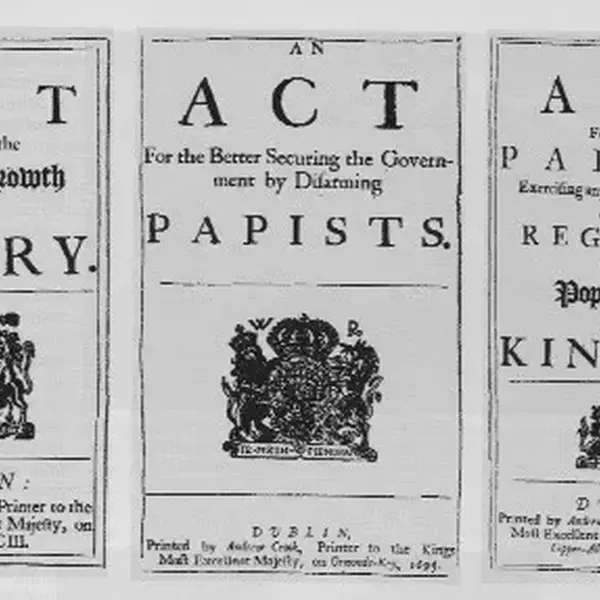
Penal Law to Prevent the Further Growth of Property Restricts Landholding Rights for Catholics
March 04, 1704
An Act to prevent the further Growth of Popery (2 Anne, c.6; commonly known as the Popery Act or the Gavelkind Act) was an Act of the Parliament of Ireland that was passed in 1704 designed to suppress Roman Catholicism in Ireland (“Popery”). William Edward Hartpole Lecky called it the most notorious of the Irish Penal Laws.
Inheritance in traditional Irish law used gavelkind, whereby an estate was divided equally among a dead man’s sons. In contrast, English common law used male primogeniture, with the eldest son receiving the entire estate. The 1704 act enforced gavelkind for Catholics and primogeniture for Protestants.
In 1704, the British Parliament enacted one of several penal laws aimed at suppressing the rights and freedoms of Roman Catholics in Ireland. This particular law was designed to prevent the further growth of popery (Catholicism) by severely restricting the landholding rights of Catholics. The penal laws as a whole were a series of statutes imposed with the intent to disenfranchise Catholics and Dissenters (Protestants who were not members of the Church of Ireland) in favor of the Anglican Church of Ireland, which was the established church and aligned with the English monarchy and Anglicanism.
The 1704 penal law regarding landholding included provisions that made it extremely difficult for Catholics to acquire land. For example, it prohibited Catholics from purchasing land or leasing it for more than 31 years. Additionally, under the rules of gavelkind enforced by this law, a Catholic landowner’s estate would be divided equally among all his sons upon his death unless the eldest son converted to the Church of Ireland, in which case he would inherit the entire estate. This was intended to encourage conversion to Protestantism and to dilute Catholic landholdings over generations.
These restrictions were part of a broader strategy to diminish the economic power and influence of Catholics in Ireland and to solidify Protestant Ascendancy, ensuring that political, economic, and social power remained in the hands of the Protestant minority. The penal laws covered various aspects of life, including education, religious practice, and public office holding, collectively imposing severe limitations on the rights of Catholics and Dissenters to participate fully in Irish society.
The impact of the penal laws, including the 1704 statute, was profound, leading to significant hardship for Catholics and contributing to long-term social and economic disparities in Ireland. The laws were gradually relaxed and repealed over the 18th and 19th centuries, with significant milestones including Catholic Emancipation in 1829. However, the legacy of the penal laws and the divisions they entrenched have had a lasting effect on Irish history and the relationship between Ireland and Britain.